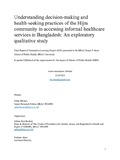Understanding decision-making and health-seeking practices of the Hijra community in accessing informal healthcare services in Bangladesh: an exploratory qualitative study

View/Open
Date
2023Publisher
Brac UniversityAuthor
Iftekhar, Yeasir InzzamamMetadata
Show full item recordAbstract
In Bangladesh and other South Asian countries, Hijra people, mainly a community of
transgender women who follow a particular cultural system, faces a multitude of barriers while
trying to access their right to healthcare services. In this paper, we aimed to understand
decision-making factors and health-seeking practices of Hijra community in accessing informal
healthcare services, focusing on their common health problems, their perception and knowledge
of health, patterns of healthcare utilization along with the challenges faced and reasons for
decision making in seeking healthcare from informal facilities in Bangladesh.
The exploratory qualitative study was conducted among 26 self-identified Hijra persons, and 5
key informants affiliated with the Hijra community, during the period of November to December
of 2022 in different areas of Dhaka. Two qualitative guidelines were used to collect data via
face-to-face in-depth and key-informant interviews. Thematic analysis was used to identify key
concepts, cluster themes into patterns and conclude meaning from those patterns.
Findings reveal that Hijra persons have poor knowledge and understanding about their own
health, and sought healthcare services from informal health facilities more than formal health
facilities, particularly from pharmacies, kobiraji, hujur, homeopathy and through
self-medication. The Hijra population reported a number of reasons in opting for informal
services, including better availability and accessibility, influence from peers and support
network, negative attitude of formal healthcare providers, non-friendly interaction and
discrimination from other patients, attendants and staff, along with long waiting times and
harassment in formal health facilities. Our findings highlight the need for understanding of
gender orientation, and sensitization of Hijra lifestyle for formal healthcare providers, policies
for Hijra inclusivity in healthcare services.
